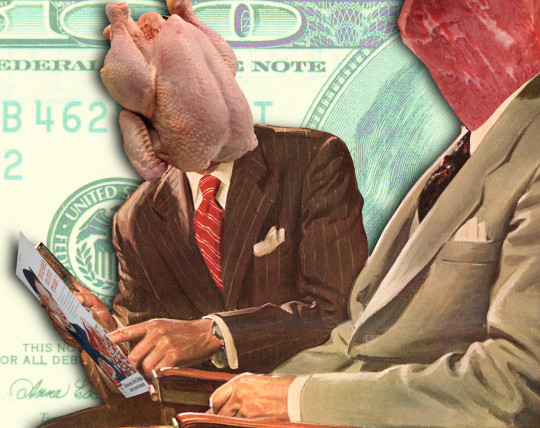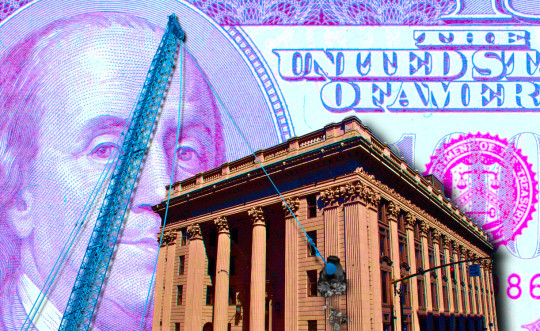#scraping
Text
(scowl) Whoopee.
Here's a link to the searchable list of books / authors that were scraped.
Colleagues, check it out... better to know if you're there.
Here's my list of stuff I sweated and bled over that people took to use without my permission, and will doubtless use—in whatever horrible, post-digested form—to cheat living, breathing writers out of work. (It pales beside other people's lists, such as Peter David's and @neil-gaiman's, included in the linked article.)

1K notes
·
View notes
Text
| styrofoam drawing _1_|_2_|_3_|_4_ by sizzlefox
| contains: sizzling, scraping, poking, drawing, burning
#4 sounds like a minecraft blaze#asmr#asmr video#asmr sounds#scraping#poking#trypophobia#sizzling#destruction#tiktok#styrofoam#auditiory#visual#drawing#satisfying#oddly satisfying
436 notes
·
View notes
Text
For 40 years, Big Meat has openly colluded to rig prices

On October 7–8, I'm in Milan to keynote Wired Nextfest.

Noted socialist agitator Adam Smith once wrote, "People of the same trade seldom meet together, even for merriment and diversion, but the conversation ends in a conspiracy against the publick, or in some contrivance to raise prices."
Smith was articulating a basic truth: when an industry grows concentrated, it grows cozy. Cultural differences between dominant firms are homogenized as top executives move from company to company, cross-pollinating attitudes and approaches. Ambituous, firm-hopping workaholic top brass make all their friends at the office, and so their former colleagues from one or two jobs back remain in their social circles.
Once an industry consists of half a dozen firms, the people running those companies constitute an incestuous financial polycule. They are executors of one anothers' estates, best men and maids of honor at one anothers' weddings, godparents to each others' kids. They play on the same softball teams and take family vacations together.
It would be heartwarming if it wasn't so costly to the rest of us. Remember Smith's maxim: "the conversation ends in a conspiracy against the publick, or in some contrivance to raise prices." Class solidarity among corporate executives forms a united front to screw us in every conceivable way, from corrupting our politicians to maiming and cheating workers to gouging buyers.
That's the basis of American antitrust law. When Robert Sherman was stumping for the passage of the Sherman Act, America's first major antitrust law, he thundered "If we will not endure a King as a political power we should not endure a King over the production, transportation, and sale of the necessaries of life. If we would not submit to an emperor we should not submit to an autocrat of trade with power to prevent competition and to fix the price of any commodity":
https://pluralistic.net/2022/02/20/we-should-not-endure-a-king/
Or rather, that was the basis of American antitrust law – until the Reagan era, when the fringe theories of the Nixonite criminal Robert Bork were elevated to a new orthodoxy. Under Bork's conception of antitrust, monopolies were evidence of excellence. If a company puts all its competitors out of business, that must mean that it is "efficient."
In Bork's fantasy world, the only way a company could attain dominance is by being so beloved by its customers that every competitor withers away. Governments that bust monopolies aren't protecting the public from "autocrats of trade"; they're overthrowing the winners of an election where you "vote with your wallet" to pick the best company.
But Bork and his co-fantasists couldn't quite manage all that with a straight face. They grudgingly admitted that a certain kind of bad monopolist could hypothetically exist, one that used its "market power" to raise prices or lower quality. Only when these offenses against our "consumer welfare" occurred should the state step in to protect its people.
This may sound good in theory, but in practice, it was a dead letter. The consumer welfare test isn't as simple as "If prices go up after a merger, punish the company." Instead, the government had to prove that the price raises came from "market power," and not from an increase in energy or labor costs, or some other "exogenous factor," like Mercury being in retrograde:
https://pluralistic.net/2022/11/10/you-had-one-job/#thats-just-the-as
And wouldn't you know it, it turns out that the mathematical models prescribed to distinguish greed from unavoidable circumstance inevitably "prove" that the monopolist wasn't at fault. Surely, it's just just a coincidence that the priesthood that understood how to make and interpret these models were Chicago School Economists who sold model-making as a service to companies that wanted to raise prices.
Pro-monopoly economists insist that this isn't true, and that their theory still has room to prosecute bad monopolies and cartels where they occur – more, they say this is already happening. In particular, they insist that "greedflation" can't be real, because it would require the kind of conspiracy that Smith warned of, and that their sickly antitrust enforcement is sufficient to prevent:
https://pluralistic.net/2023/03/11/price-over-volume/#pepsi-pricing-power
This strains credulity. After all, the CEOs of giant companies in concentrated industries openly boast to their shareholders about how they've used the covid and Ukraine invasion shocks to hike prices to increase their profit margins – not just cover their additional costs:
https://pluralistic.net/2023/01/23/cant-make-an-omelet/#keep-calm-and-crack-on
While excuseflation is new, open, naked price-fixing by industry cartels is not. Take the meat-packing industry, dominated by a tiny handful of giant corporations whose executives literally ran a betting pool on how many of their workers would get covid each week while working in their cramped, unventilated factories:
https://www.bbc.com/news/world-us-canada-55009228
These companies have seen their margins soar – up 300% over the lockdown – while their payments to ranchers and growers cratered:
https://www.reuters.com/business/meat-packers-profit-margins-jumped-300-during-pandemic-white-house-economics-2021-12-10/
All this might leave one wondering whether there isn't something a little, you know, "conspiracy against the publick"-y going on in Big Meat?
Let me tell you about Agri Stats. Agri Stats has been around since 1985. Every large meat packer pays to be a "member" of Agri Stats, and they each submit weekly, detailed statistics about every aspect of their business: all their costs, all their margins, broken out by category. Agri Stats compiles this into phone-book-thick books that each member gets every week, telling them everything about how all of their competitors are running their businesses:
https://www.agristats.com/history
The companies whose data appears in this book are anonymized, but it's trivial to re-identify each supplier. Tyson execs hold regular "naming process" meetings where they go through new books and de-anonymize the data. A Butterball exec confirmed that he "can pick the companies for rankings with 100% certainty."
As David Dayen writes in The American Prospect, these books are incredibly detailed: "bird weights, freezer inventory, and 'head killed per operating hour.'" Within the cozy meat cartels, Agri Stats acts as a clearinghouse that allows every business in the industry to act in concert, running the entire meat-packing sector as a single company:
https://prospect.org/power/2023-10-03-lawsuit-highlights-why-meat-overpriced/
As interesting as the list of Agri Stats members is, the groups that don't get to see Agri Stats' "books" is just as important: "farmers, workers, or retailers." Agri Stats also offers consulting services to its members. As an exec at pork processor Smithfield put it, Agri Stats advice boils down to four words "Just raise your price."
Agri Stats ranks its members based on how high their prices are – they literally publish a league table with the highest prices at the top. Meat packers pay bonuses to their execs based on how high the company's rank is on that table. Agri Stats meets with its members throughout the year to discuss "price opportunities" and to advise them to "exercise restraint" by restricting supply to keep prices up. When one Agri Stats member considered leaving the cartel, Agri Stats wooed them back by telling them how to make an additional $100k by raising bacon prices.
The reason Dayen is writing about Agri Stats now is that the DoJ Antitrust Division has brought an antitrust suit against them. This is part of a wave of antitrust actions brought by Biden's DoJ and FTC, who, along with his NLRB, are shaping up to be the most pugnacious, public-interest force against corporate power since the Reagan administration:
https://www.meatpoultry.com/articles/29124-doj-sues-agri-stats-for-complicity-in-meat-market-manipulation
All this enforcement isn't a coincidence. It comes from an explicit rejection of neoliberalism's core tenets: inequality reflects merit, monopolies are efficient, and government can't do anything. In Biden's DoJ, FTC and NLRB, they're partying like it's 1979:
https://www.eff.org/deeplinks/2021/08/party-its-1979-og-antitrust-back-baby
What's amazing about the Agri Stats conspiracy to raise prices is that it's been going since the Reagan administration. It's a smoking gun proof that "consumer welfare" never cared about price-fixing and robbing the public (can a gun still smoke after 40 years?). There was never a time when consumer welfare antitrust cared about consumer welfare. It was always and forever a front for "a conspiracy against the publick," a "contrivance to raise prices."
Big Meat has been robbing America for two generations. Some of those stolen funds were used to corrupt our political process. The meat sector gets $50 billion in public subsidies and still gouges us on prices and rips off its suppliers:
https://www.ewg.org/news-insights/news/2022/02/usda-livestock-subsidies-near-50-billion-ewg-analysis-finds
Which means that it's possible that we're simultaneously being ripped off with meat prices and that meat prices are artificially low. Try and wrap your head around that one!
The do-nothing, pro-monopoly neoliberal antitrust is a virus that spread around the world. The EU's antitrust laws were reshaped to mirror American laws after the war through the Marshall Plan, but since the late 1970s, European lawmakers and enforcers have ignored their own laws (just like their American counterparts) and encouraged monopolies as "efficient."
This Made-in-Europe oligopoly, combined with energy and grain shocks from Russian invasion of Ukraine, created the perfect storm for European greedflation. As food prices spiked across the EU, Austrian hacktivist Mario Zechner set out to investigate Austrian grocers' pricing. Using the grocers' own APIs, he was able to compile and analyze a dataset of prices at Austrian grocers:
https://www.wired.com/story/heisse-preise-food-prices/
When Zechner open-sourced his project, collaborators showed up to expand the project across other EU countries, and an anonymous party donated a huge database of prices stretching back to 2017. The data reveals clear collusion among the grocers, who raise prices in near-lockstep, and use gimmicks like cyclic price drops to hide their collusion:
https://github.com/badlogic/heissepreise
Not every grocer has an API, and even the ones that do have APIs could easily block Zechner and co from accessing their data. When that happens, they could – and should – turn to scraping to continue their project. They should also scrape grocers elsewhere, including in Canada, where grocers rigged the price of bread:
https://pluralistic.net/2023/09/25/deep-scrape/#steering-with-the-windshield-wipers
Because Big Meat's "conspiracy against the publick" isn't unique to meat. It's in all our food, it's in all our goods, it's in all our services. The fact that the meat industry was able to rob American buyers, ranchers and farmers for two generations under a 200' tall neon sign that blinked "AGRI STATS AGRI STATS AGRI STATS" night and day is frankly astonishing.
But there's never just one ant. If the meatheads running Big Meat were able to do this in broad daylight since the NES years, imagine what all the other industries were able to get up to in the shadows.

If you'd like an essay-formatted version of this post to read or share, here's a link to it on pluralistic.net, my surveillance-free, ad-free, tracker-free blog:
https://pluralistic.net/2023/10/04/dont-let-your-meat-loaf/#meaty-beaty-big-and-bouncy


My next novel is The Lost Cause, a hopeful novel of the climate emergency. Amazon won't sell the audiobook, so I made my own and I'm pre-selling it on Kickstarter!
#pluralistic#meat#monoopoly#price fixing#antitrust#austria#mario zechner#scraping#adversarial interoperability#greedflation#price inflation#market power#david dayen#agri stats#meat packers
320 notes
·
View notes
Text









WALL OF EYES
👁️🗨️|👁️🗨️|👁️🗨️
👁️🗨️|👁️🗨️|👁️🗨️
👁️🗨️|👁️🗨️|👁️🗨️
#talos stimboards#stimboard#stim#album stimboard#the smile#radiohead#wall of eyes#art stim#paint#painting#irl hands#eyes#scopo#food#toast#liquid#irl food#flow#scraping#orange#blue#red#yellow#white#gif ids#id in alt
100 notes
·
View notes
Text
By the way - I've had my work scraped by AI before. I'm protected only in that the AI sucks when it comes to minoritised languages. The site where I saw my work was a scam bookstore selling a Victorian Welsh dictionary and clearly a scraping ai saw my work had the words "Welsh" and "Dictionary" in it and went ham. Resulting in a product description with bits of my work on LGBT+ terminology in it. This anecdote in itself is funny, but the practice of ai scraping is not. I'm a writer and many thousands of writers like me depend on our written output for our livelihoods/careers. Allowing ai scraping on tumblr is putting a lot of people's livelihoods at risk. I don't even earn anything from my work- but I know many others who rely on their writing to get by and I'm so worried for all of them.
I genuinely don't want to leave this site. I refuse to move anywhere else and want to make this a better place. Rather than migrate platforms every few years.
Automattic, do better. Tagging @staff to voice concerns, but do so with the caveat I know it's none of their fault. This is an Automattic issue mainly.
61 notes
·
View notes
Photo


3ce_official on ig
#makeup#makeup destruction#stim#sensory#satisfying#mypost#mygifs#glitter#scraping#cosmetics#hands free#handsfree#breaking
179 notes
·
View notes
Text









lemres stimboard w shiny things n candy!
🍭 ✨ 🍭
✨ 🍭 ✨
🍭 ✨ 🍭
#lemres#puyo puyo#puyo puyo stimboard#puyo stimboard#candy stim#candies#shiny stim#shiny#green#food#pouring#bunnies#yellow#butterflies#art#glitter#purple#piping#lollipop#lollipops#rock slime#rainbow#clear#dice#scraping#stimboard#stim#sensory#stimmy#schezlover.board
28 notes
·
View notes
Text









Stonemasonry Stimboard
x x x / x x x / x x x
[Image description: a 9 gif stimboard; from left to right.
First line: a close up gif of hands carving straight lines in a stone ball, a gif of two people using an axe and mallet to chop a long rectangle piece of stone into pieces and, a gif of someone using a large chisel and hammer to shave off the corner of a block of stone.
Second line: a gif of someone using a chisel and heavy mallet to cut a large block of stone, the chip flies up towards the ceiling. A close up gif of hands carving intricate designs into a stone pot with a sharp tool, and a gif of jumpcuts between quick close ups of a chisel being used to carve designs into a dark stone.
Third line: a gif of someone using a chisel and hammer to chop sections off the side of a rectangular piece of stone, a gif of hands using a chisel to carve a curved design into a light stone, and a gif of hands using a chisel to carve a dragon design into a dark stone.
End of image description.]
#stimboard#hands#stones#stonemasonry#stonework#chopping#hammer#knives#cutting#chisel#scraping#dust#gloves#sculpting
39 notes
·
View notes
Text









oreos
x - x - x | x - x - x | x - x - x
#stim#stimboard#teddy posts#food#oreos#yellow#brown#black#dipping#milk#opening#scraping#sweet#white#crushing
65 notes
·
View notes
Text


Scraping up safety tape

#scraping#caution tape#yellow#grey#fast gif#stim#stimmy#stim gif#stim gifs#visual stim#my uploads#my gifs
33 notes
·
View notes
Video
_1_|_2_|_3_ by paint_mixings
#paint mixing#paint#mixing#request#visual#scraping#bright colors#bright colors/#art#art stim#stim#stimmy#stimming#visual asmr#background noise#compilation#satisfying#soothifying
989 notes
·
View notes
Text
An interoperability rule for your money

This is the final weekend to back the Kickstarter campaign for the audiobook of my next novel, The Lost Cause. These kickstarters are how I pay my bills, which lets me publish my free essays nearly every day. If you enjoy my work, please consider backing!

"If you don't like it, why don't you take your business elsewhere?" It's the motto of the corporate apologist, someone so Hayek-pilled that they see every purchase as a ballot cast in the only election that matters – the one where you vote with your wallet.
Voting with your wallet is a pretty undignified way to go through life. For one thing, the people with the thickest wallets get the most votes, and for another, no matter who you vote for in that election, the Monopoly Party always wins, because that's the part of the thick-wallet set.
Contrary to the just-so fantasies of Milton-Friedman-poisoned bootlickers, there are plenty of reasons that one might stick with a business that one dislikes – even one that actively harms you.
The biggest reason for staying with a bad company is if they've figured out a way to punish you for leaving. Businesses are keenly attuned to ways to impose switching costs on disloyal customers. "Switching costs" are all the things you have to give up when you take your business elsewhere.
Businesses love high switching costs – think of your gym forcing you to pay to cancel your subscription or Apple turning off your groupchat checkmark when you switch to Android. The more it costs you to move to a rival vendor, the worse your existing vendor can treat you without worrying about losing your business.
Capitalists genuinely hate capitalism. As the FBI informant Peter Thiel says, "competition is for losers." The ideal 21st century "market" is something like Amazon, a platform that gets 45-51 cents out of every dollar earned by its sellers. Sure, those sellers all compete with one another, but no matter who wins, Amazon gets a cut:
https://pluralistic.net/2023/09/28/cloudalists/#cloud-capital
Think of how Facebook keeps users glued to its platform by making the price of leaving cutting of contact with your friends, family, communities and customers. Facebook tells its customers – advertisers – that people who hate the platform stick around because Facebook is so good at manipulating its users (this is a good sales pitch for a company that sells ads!). But there's a far simpler explanation for peoples' continued willingness to let Mark Zuckerberg spy on them: they hate Zuck, but they love their friends, so they stay:
https://www.eff.org/deeplinks/2021/08/facebooks-secret-war-switching-costs
One of the most important ways that regulators can help the public is by reducing switching costs. The easier it is for you to leave a company, the more likely it is they'll treat you well, and if they don't, you can walk away from them. That's just what the Consumer Finance Protection Bureau wants to do with its new Personal Financial Data Rights rule:
https://www.consumerfinance.gov/about-us/newsroom/cfpb-proposes-rule-to-jumpstart-competition-and-accelerate-shift-to-open-banking/
The new rule is aimed at banks, some of the rottenest businesses around. Remember when Wells Fargo ripped off millions of its customers by ordering its tellers to open fake accounts in their name, firing and blacklisting tellers who refused to break the law?
https://www.npr.org/sections/money/2016/10/07/497084491/episode-728-the-wells-fargo-hustle
While there are alternatives to banks – local credit unions are great – a lot of us end up with a bank by default and then struggle to switch, even though the banks give us progressively worse service, collectively rip us off for billions in junk fees, and even defraud us. But because the banks keep our data locked up, it can be hard to shop for better alternatives. And if we do go elsewhere, we're stuck with hours of tedious clerical work to replicate all our account data, payees, digital wallets, etc.
That's where the new CFPB order comes in: the Bureau will force banks to "share data at the person’s direction with other companies offering better products." So if you tell your bank to give your data to a competitor – or a comparison shopping site – it will have to do so…or else.
Banks often claim that they block account migration and comparison shopping sites because they want to protect their customers from ripoff artists. There are certainly plenty of ripoff artists (notwithstanding that some of them run banks). But banks have an irreconcilable conflict of interest here: they might want to stop (other) con-artists from robbing you, but they also want to make leaving as painful as possible.
Instead of letting shareholder-accountable bank execs in back rooms decide what the people you share your financial data are allowed to do with it, the CFPB is shouldering that responsibility, shifting those deliberations to the public activities of a democratically accountable agency. Under the new rule, the businesses you connect to your account data will be "prohibited from misusing or wrongfully monetizing the sensitive personal financial data."
This is an approach that my EFF colleague Bennett Cyphers and I first laid our in our 2021 paper, "Privacy Without Monopoly," where we describe how and why we should shift determinations about who is and isn't allowed to get your data from giant, monopolistic tech companies to democratic institutions, based on privacy law, not corporate whim:
https://www.eff.org/wp/interoperability-and-privacy
The new CFPB rule is aimed squarely at reducing switching costs. As CFPB Director Rohit Chopra says, "Today, we are proposing a rule to give consumers the power to walk away from bad service and choose the financial institutions that offer the best products and prices."
The rule bans banks from charging their customers junk fees to access their data, and bans businesses you give that data to from "collecting, using, or retaining data to advance their own commercial interests through actions like targeted or behavioral advertising." It also guarantees you the unrestricted right to revoke access to your data.
The rule is intended to replace the current state-of-the-art for data sharing, which is giving your banking password to third parties who go and scrape that data on your behalf. This is a tactic that comparison sites and financial dashboards have used since 2006, when Mint pioneered it:
https://www.eff.org/deeplinks/2019/12/mint-late-stage-adversarial-interoperability-demonstrates-what-we-had-and-what-we
A lot's happened since 2006. It's past time for American bank customers to have the right to access and share their data, so they can leave rotten banks and go to better ones.
The new rule is made possible by Section 1033 of the Consumer Financial Protection Act, which was passed in 2010. Chopra is one of the many Biden administrative appointees who have acquainted themselves with all the powers they already have, and then used those powers to help the American people:
https://pluralistic.net/2022/10/18/administrative-competence/#i-know-stuff
It's pretty wild that the first digital interoperability mandate is going to come from the CFPB, but it's also really cool. As Tim Wu demonstrated in 2021 when he wrote Biden's Executive Order on Promoting Competition in the American Economy, the administrative agencies have sweeping, grossly underutilized powers that can make a huge difference to everyday Americans' lives:
https://www.eff.org/de/deeplinks/2021/08/party-its-1979-og-antitrust-back-baby

If you'd like an essay-formatted version of this post to read or share, here's a link to it on pluralistic.net, my surveillance-free, ad-free, tracker-free blog:
https://pluralistic.net/2023/10/21/let-my-dollars-go/#personal-financial-data-rights


My next novel is The Lost Cause, a hopeful novel of the climate emergency. Amazon won't sell the audiobook, so I made my own and I'm pre-selling it on Kickstarter!

Image:
Steve Morgan (modified)
https://commons.wikimedia.org/wiki/File:U.S._National_Bank_Building_-_Portland,_Oregon.jpg
Stefan Kühn (modified)
https://commons.wikimedia.org/wiki/File:Abrissbirne.jpg
CC BY-SA 3.0
https://creativecommons.org/licenses/by-sa/3.0/deed.en
-
Rhys A. (modified)
https://www.flickr.com/photos/rhysasplundh/5201859761/in/photostream/
CC BY 2.0
https://creativecommons.org/licenses/by/2.0/
#pluralistic#cfpb#interoperability mandates#mint#scraping#apis#privacy#privacy without monopoly#consumer finance protection bureau#Personal Financial Data Rights#interop#data hoarding#junk fees#switching costs#section 1033#interoperability
157 notes
·
View notes
Text




Source
#stim#stim gif#stim gifs#stimblr#visual stim#food stims#knife cw#scraping#salmon#scales#silver#my gifs
13 notes
·
View notes
Text









makeup repair💛💚💙
#stim#makeup repair#theater mask#yellow#green#blue#scraping#cleaning#paint#concealer#🌒 gifs#irl hands
12 notes
·
View notes
Text


robot.beauty on ig
#makeup#makeup destruction#stim#sensory#satisfying#mypost#mygifs#gold#glitter#cosmetics#breaking#scraping
22 notes
·
View notes